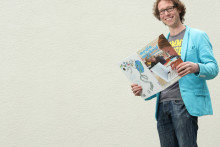´I was bullied myself when I was a kid. I´m not ashamed of it anymore. I actually believe that being bullied gives victims an extra drive to succeed in life.´ Meet Niels Baas. Winner of two best teacher awards and the thesis award of behavioural sciences, director of ´Cyberpesten de Baas´ and regularly asked by national media to give his opinion on online risks and children. And not to forget, the PhD candidate introduced this research theme on the UT by himself. Indeed, he is doing well.
Cyber bullying
Even though Niels is still young, he is old enough to belong to the ´pre-cyber bullying´ era. What are the differences between on- and offline bullying? Niels: It´s hard to guess how messages are interpreted online. Adults already struggle with this, let alone children.´ Niels sees that discussions often escalate because of misinterpretations. But there´s another important reason. Niels: ´Adolescents have a false sense of safety. There is a lower boundary to say nasty things because there is no one to put them into their place.´
So is the Internet really all that bad? Niels doesn´t believe so. It´s the media that make it scary. ´We hear many sensational stories when it goes wrong.´ Niels reacts on recent suicides. ´I partner with the children´s helpdesk. After such news, they receive more phone calls from children who are also thinking about committing suicide because they are being bullied. Such media coverage sends the message that death is a solution, and confronts the children with the fact that apparently, their situation is that bad. We shouldn´t want this!´
Niels acknowledges that the media is becoming more careful. And right so, because it would only increase fear amongst parents. Fear, which is completely out of place. ´Brains aren´t fully developed until we are 23 or 24 years old. In the offline world, in the streets, there are risks too. But we do let our children discover that world.´ According to Niels, the same applies online. ´Just as in the streets, the Internet has some dark alleys and we cannot prevent our children from going there. The key is to not make it a bigger deal than it is and to keep the door to conversation open when something goes wrong.´
Positive please
One of the pillars of Niels´ work is that he considers children as the experts. ´I listen to them and tell the parents what I learned.´ On his regular parent meetings in schools, he dismantles the obvious. ´By continuously telling children that the Internet is a scary place and patronizing them, we frustrate them immensely.´ Niels is a strong believer of treating children as equals, asking them to give us a tour in their online world, and letting them know we are there should they need us. Niels: ´Let´s make things positive again.´







